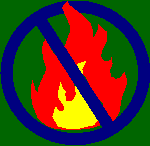
This Site © Copyright 1998 EBFRIP
20 April 1999
EBFRIP STATEMENT ON COMMISSION CLOSURE OF BLUE ANGEL COMPLAINT
The European Commission has confirmed, in a letter to EBFRIP dated 26 February 1999, that "products which…do not comply with the (German Blue Angel) eco-label system, can be marketed in Germany without any hindrance". The Commission has informed EBFRIP that this is recognised by "... the German authorities (who) pointed out that the German eco-label system is a voluntary certification scheme system without any obligation on producers or providers to join it."
This letter thus closes EBFRIP's legal complaint against the Blue Angel that criteria excluding the use of certain brominated flame retardants were a barrier to trade. An earlier complaint against the Nordic White Swan came to similar conclusions.
In closing this complaint, the EU Commission and the German authorities expressly recognise that both the Nordic White Swan and the German Blue Angel scheme are voluntary, and that there is no obligation for producers or suppliers to adhere to their criteria. Therefore product manufacturers are free to continue to supply products that best suit the market demand, as there are no sales restrictions.
Consumers are free to continue to purchase the E&E products that best suit their needs, including products which offer the highest levels of fire safety protection thanks to the incorporation of brominated flame retardants into certain E&E plastics.
Brominated flame retardants can be used for some Blue Angel and White Swan product groups, notably copiers. The reason for this is that BFR-containing plastics are have been shown to be easier to recycle than other available alternatives (1). In such cases, the restrictions are limited to excluding the use of PBDEs and PBBs.
The extent to which eco-labels such as the Blue Angel provide brands with market advantage remains questionable. Indeed, for televisions and printers there appears to be little or no interest on the part of manufacturers, no Blue Angel having been awarded so far to any product in either of these two groups.
Nevertheless, if any manufacturers, distributors, or importers encounter trade barriers as a result of the Blue Angel or White Swan eco-label criteria for E&E products and the use of flame retardants, EBFRIP would be interested in learning of this discrimination.
(1) Ricoh Presentation to BSEF Seminar in Tokyo, November 6, 1998
